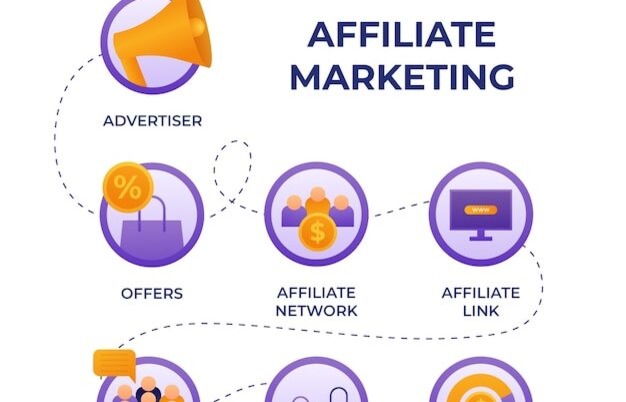Affiliate marketing has become a popular method for businesses to grow their sales while offering individuals the opportunity to earn passive income. By promoting a company’s products or services, affiliates receive a commission for every sale made through their referral. This comprehensive guide covers everything you need to know about affiliate marketing, from its basics to strategies for maximizing your profits.
What is Affiliate Marketing
Affiliate marketing is a performance-based marketing strategy where businesses reward affiliates (marketers) for driving traffic or sales to their website through referral links. The process involves four key players: the merchant (the company selling the product), the affiliate (the marketer promoting the product), the customer, and the affiliate network (optional third-party platforms that manage affiliate programs).
In its simplest form, affiliate marketing operates on a cost-per-action (CPA) model, meaning affiliates earn commissions when a desired action (typically a sale) is completed through their referral.
How Does Affiliate Marketing Work?

At the heart of affiliate marketing is the affiliate link—a unique URL provided to each affiliate. Here’s how the process works:
- Join an Affiliate Program: Affiliates sign up for programs offered by companies or affiliate networks like Amazon Associates, ShareASale, or CJ Affiliate.
- Get a Unique Affiliate Link: Affiliates receive a specific link to promote the company’s products.
- Drive Traffic: Affiliates share their links through blogs, social media, emails, or paid advertising.
- Earn Commissions: When a user clicks on the link and completes the desired action (purchase, sign-up, etc.), the affiliate earns a percentage of the sale.
Types of Affiliate Marketing Programs
Different affiliate programs cater to various industries and goals.
1. Pay-Per-Sale (PPS)
This is the most common form of affiliate marketing.
2. Pay-Per-Lead (PPL)
In this model, affiliates are paid for generating leads—this could be someone signing up for a newsletter, filling out a contact form, or registering for a free trial. The commission is a fixed amount rather than a percentage.
3. Pay-Per-Click (PPC)
Affiliates are compensated for every visitor they send to the merchant’s website, regardless of whether the visitor makes a purchase. PPC affiliate marketing is less common but can be effective in high-traffic websites.
Benefits of Affiliate Marketing
There are numerous advantages to both affiliates and merchants when participating in affiliate marketing programs:
1. Low Start-Up Costs
For affiliates, there’s no need to create a product or service. Simply choose a product to promote, and you’re ready to start earning.
2. Passive Income Potential
Once set up, affiliate marketing can generate a steady stream of income with minimal maintenance. Affiliates can earn money even while they sleep.
3. Wide Range of Choices
With thousands of products and services available for promotion, affiliates can choose to work with brands that align with their niche and audience.
4. Scalability
Affiliate marketing allows you to scale your efforts.

Effective Affiliate Marketing Strategies for Maximum Earnings
While affiliate marketing can be simple to start, success requires strategic planning and effort. Here are some tips to help you maximize your affiliate marketing income:
1. Choose the Right Niche
Selecting a niche that you’re passionate about is crucial to long-term success. Ideally, your niche should have a combination of high demand and low competition. This makes it easier to stand out and build authority in that area.
2. Build an Engaged Audience
Successful affiliate marketing relies heavily on trust. Building an engaged audience that trusts your recommendations can lead to higher conversion rates. Start by creating valuable content that helps solve your audience’s problems.
3. Leverage Content Marketing
Content marketing is an essential strategy in affiliate marketing. Whether through blog posts, videos, podcasts, or social media, high-quality, informative content drives traffic and builds trust. Make sure to include your affiliate links in content that offers solutions and actionable advice to your audience.
4. SEO Optimization
Search engine optimization (SEO) is critical in affiliate marketing. By using keyword-rich content and optimizing your blog or website for search engines, you can increase your organic traffic. Focus on relevant keywords that your target audience is searching for and ensure your site loads quickly and is mobile-friendly.
5. Email Marketing
Through a well-crafted email marketing campaign, you can introduce products, provide valuable insights, and include your affiliate links in a personalized manner.
6. Social Media Promotion
Leverage social media platforms like Instagram, YouTube, and Pinterest to share your affiliate links. Use engaging posts, stories, and videos to capture the attention of your followers and drive them to click on your links.
7. Paid Advertising
While organic traffic is essential, paid advertising through platforms like Google Ads or Facebook Ads can help you reach a broader audience faster. Targeting specific demographics or interests ensures your ads are seen by people likely to convert into sales.
Challenges of Affiliate Marketing

While the potential rewards are high, affiliate marketing has its challenges:
1. High Competition
As more people become aware of the benefits of affiliate marketing, competition has increased. Affiliates need to find creative ways to stand out, such as by offering unique content or providing personal recommendations.
2. Commission-Based Income
Your earnings are directly tied to the sales generated through your links, which can fluctuate based on seasonality or changes in consumer behavior.
3. Maintaining Trust
It’s important not to compromise your audience’s trust by promoting subpar products for the sake of earning commissions. Always recommend high-quality products that offer value to your audience.
Affiliate Networks: Key Platforms for Affiliate Marketers
- Amazon Associates: One of the largest and most well-known affiliate programs, offering a wide range of products for promotion.
- ShareASale: A platform that connects affiliates with thousands of merchants across various industries.
- CJ Affiliate (Commission Junction): A well-established network that provides access to high-profile brands and detailed tracking tools.
Minecraft: An Ultimate Guide for Beginners and Enthusiasts